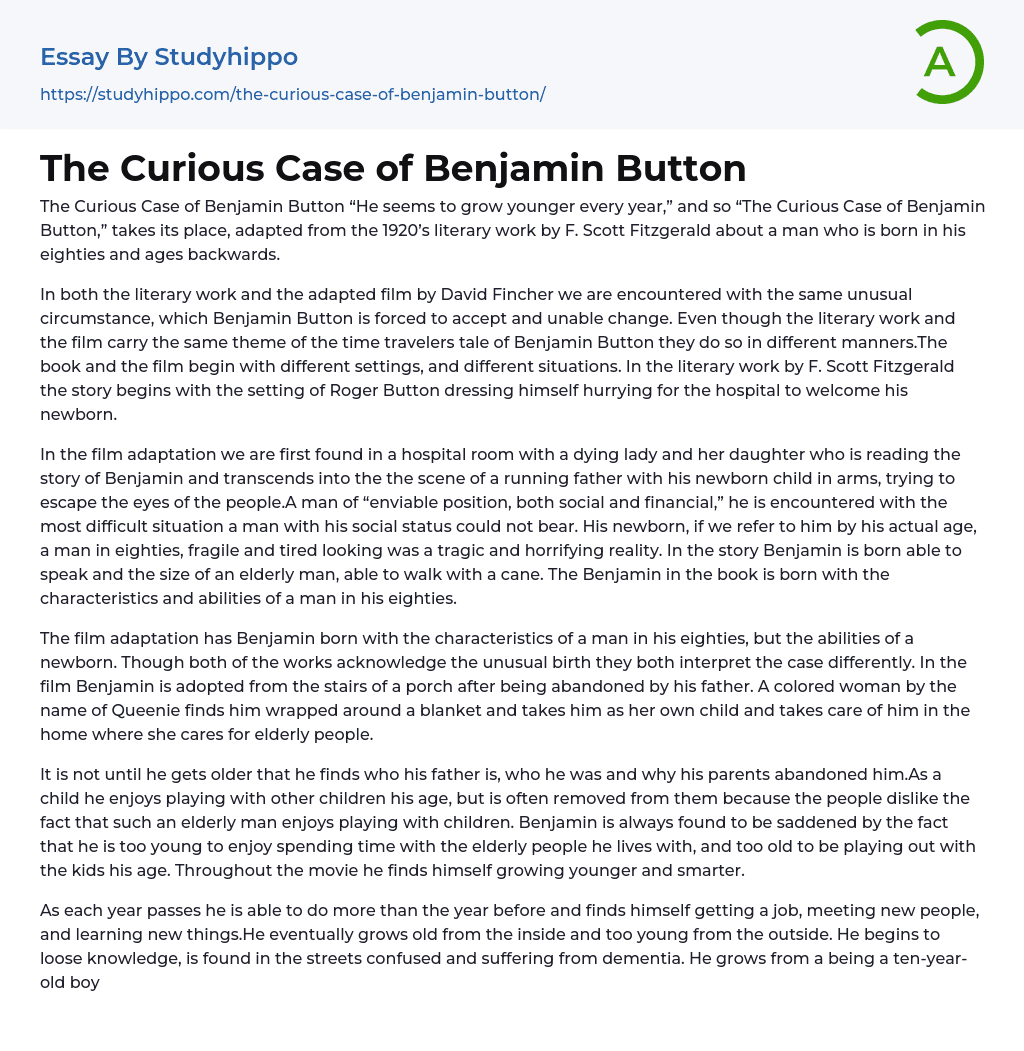The film adaptation of F. Scott Fitzgerald's 1920s literary piece, "The Curious Case of Benjamin Button," depicts the life of a man who is born in his eighties and ages in reverse, causing people to observe that he appears to become younger with each passing year.
The theme of the time travelers tale of Benjamin Button is present in both the literary work and David Fincher's adapted film. However, they approach it differently. Benjamin Button faces the same unusual circumstance in both, which he cannot change. But, the book and the film have different settings and situations at the start. F. Scott Fitzgerald's literary work starts with Roger Button dressing himself hastily to go to the hospital to see his newborn.
The film adaptation begins in a hospital room, where a dying woman's daughter reads the story of Benjamin. The sc
...ene then shifts to a father running with his newborn child, trying to evade the public eye. Despite being a man of considerable social and financial standing, the father faces an unbearable situation. His newborn child, who appears as an elderly man in his eighties, looks fragile and tired. In the book, Benjamin is born with the physical and mental abilities of an elderly man and can even speak and walk with a cane.
Benjamin's birth in the movie portrays him as having elderly characteristics but with limited infant abilities. Despite acknowledging his unusual birth, the book and movie present different interpretations. The film shows Benjamin being abandoned by his father and discovered on a porch by Queenie, who raises him alongside her elderly patients.
As he gets older, Benjamin uncovers his father's identity and backstory, as wel
as the reasons why his parents abandoned him. While he likes playing with kids his own age, some people don't approve of an old man joining in. It's regrettable to Benjamin that he can't completely interact with the elderly folks he lives with because of his youthfulness or fully take part in children's pastimes due to his advanced age. The picture shows him going through a metamorphosis in both juvenescence and intellect.
The text depicts an individual who acquires new skills and knowledge over time but also experiences a decline in memory and cognitive function with age. Ultimately, the person is discovered wandering aimlessly with confusion and dementia, having regressed from a promising ten-year-old to a state resembling that of a one-year-old, struggling to walk and communicate.
The book depicts Benjamin's unique aging process, where he is born as an elderly man with the knowledge and abilities of an older person. Throughout his life, he ages in reverse until his memory loss causes him to become younger and lose all cognitive abilities. Despite this, he can still walk, talk, express preferences and engage in conversations. Raised by his biological parents, the Buttons, Benjamin's father often gifts him toys in hopes that he will take interest in them. In the end of Benjamin's life, his long-time first love cradles him like a newborn despite being in her eighties.
Benjamin's interests differ from playing with toys as he is more inclined towards reading the encyclopedia. Despite this inclination, he exhibits remarkable memory and knowledge. But as he ages, he experiences difficulty in speaking, walking, and recognizing people - much like what was portrayed in the film adaptation of his story.
The movie version underwent a lot of modifications compared to the original literary work which surprised me upon reading it because I have already seen both works before.
According to me, the changes made in the film were smart choices as it could have seemed unrealistic on screen if they had stuck closely to the original story. Nevertheless, the filmmakers demonstrated their abilities by presenting the plot in a manner that never caused any disbelief among viewers. One instance of this is portraying Benjamin as a tiny newborn at birth instead of an elderly baby who can speak and walk.
Despite the differences in the works, they share a common theme of aging in reverse. The film based on the short story succeeded to the fullest extent possible. The fact that this film won three academy awards speaks volumes.
- Boo Radley essays
- Genesis essays
- Richard iii essays
- Alice in Wonderland essays
- On the road essays
- Ozymandias essays
- The Nightingale essays
- Holden Caulfield essays
- Animal Farm essays
- 1984 essays
- A Hanging essays
- Shooting An Elephant essays
- A Tale Of Two Cities essays
- Adventures Of Huckleberry Finn essays
- Arthur Conan Doyle essays
- Brave New World essays
- Characters In Hamlet essays
- Characters In Romeo And Juliet essays
- Desdemona essays
- Diary Of A Wimpy Kid essays
- First-Person Narrative essays
- Frankenstein essays
- Heart Of Darkness essays
- Jane Eyre essays
- Jay Gatsby essays
- King Duncan essays
- Librarian essays
- Little Red Riding Hood essays
- Lord Of The Flies essays
- Silas Marner essays
- The Cask Of Amontillado essays
- The Catcher In The Rye essays
- The Crucible essays
- The Handmaid's Tale essays
- The Reader essays
- Virgil essays
- Wuthering Heights essays
- Candide essays
- Castle essays
- J. D. Salinger essays
- Ulysses essays
- Ethan Frome essays
- In Cold Blood essays
- Outliers essays
- Tuesdays With Morrie essays
- The Art of War essays
- Wife of Bath essays
- Huckleberry Finn essays
- The Lady With The Dog essays
- Great Expectations essays




